QUEZON CITY (MindaNews / 01 January) — In a small rented room in Al Saalam Compound in Quezon City, Zorayda Samporna and her husband use cardboards as their bed and their traveling bags for pillows.
“This room is too small for my eleven children that’s why my husband and I have to sleep while sitting,” Zorayda said.
From their small window, they can hear the noise from the passing tricycles and loud chatter from the overcrowded compound.
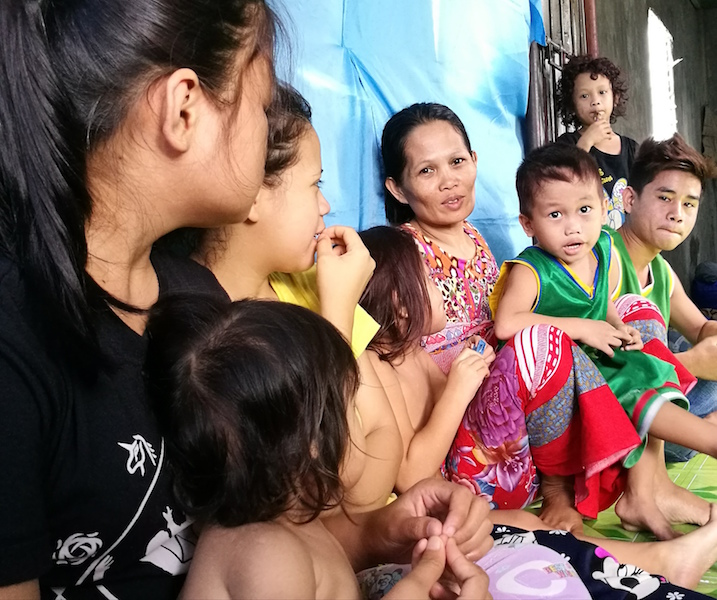 Displaced Marawi residents Zorayda Samporna and some of her eleven children moved to an evacuation center in Saguiaran, Lanao del Sur when the Marawi Crisis began on May 23 but moved to Metro Manila in August, renting a small room in Al Salaam Mosque Compound in Quezon City. Photo by REYNALD RAMIREZ
Displaced Marawi residents Zorayda Samporna and some of her eleven children moved to an evacuation center in Saguiaran, Lanao del Sur when the Marawi Crisis began on May 23 but moved to Metro Manila in August, renting a small room in Al Salaam Mosque Compound in Quezon City. Photo by REYNALD RAMIREZ
It’s a far cry from their home in Barangay Banggolo, Marawi City before the siege. “We had four rooms in our house in Marawi but now we have nothing left, only rubbles and debris,” she said.
The Samporna family is one of 77,000 families forced to flee Marawi when a foiled attempt to arrest Abu Sayyaf leader Isnilon in his apartment in the country’s lone Islamic city on May 23, 2017, triggered clashes with government forces. Hapilon, touted to be the Emir of the Islamic State (IS) in Southeast Asia, had earlier allied with the Maute Group, and within hours, their combined forces took control over parts of Marawi.
In five months, the Marawi Siege left at least1,000 persons dead, the city in ruins and thousands of people like the Samporna homeless.
The war ended in October but for displaced residents like the Samporna family, the battle to rebuild their city is far from over. “I do not know how are we going to start our lives again,” Zorayda narrated.
Meranaw Diaspora
Before moving to Manila, their family stayed in an evacuation center in Saguiaran, Lanao del Sur for two months. “We ate only two meals a day at the evacuation site. I don’t want to recall our situation in the center anymore. It was awful,” she said, holding back her tears.
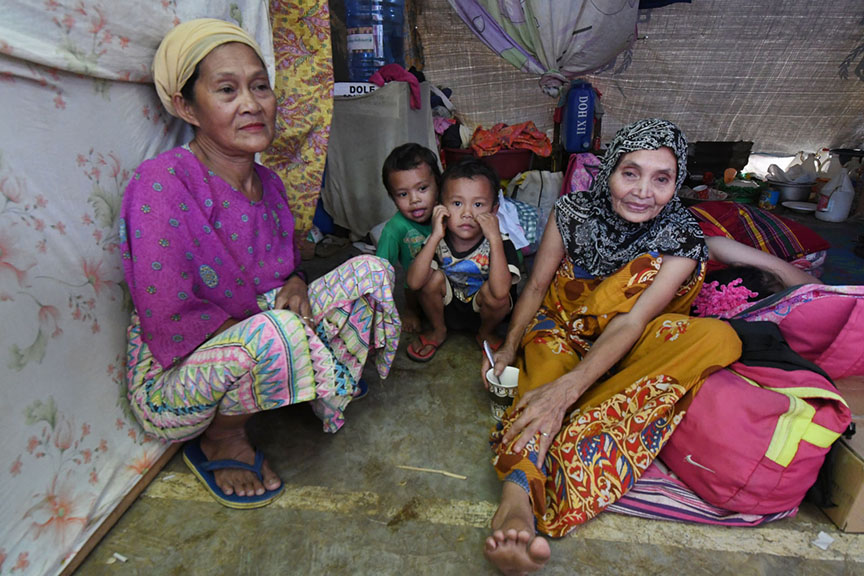 Elderly and children endure the congestion at an evacuation camp in Saguiaran, Lanao del Sur at the height of the Marawi siege. MindaNews file photo by FROILAN GALLARDO
Elderly and children endure the congestion at an evacuation camp in Saguiaran, Lanao del Sur at the height of the Marawi siege. MindaNews file photo by FROILAN GALLARDO
Sardines and instant noodles were their usual meal but the government ration was not enough to feed her 11 children, the eldest of whom is 21, and the youngest, 2.
On the third month, Zorayda, 38 and her husband Olomodin, 37, decided to borrow 40,000 pesos from a relative to fly to Manila on August 17.
“I do not want to stay in Mindanao anymore. I think we have a future in Manila,” she said.
Lanao del Sur Assemblyman Zia Alonto Adiong, Provincial Crisis Management Committee spokesperson, said the number one concern of residents who fled Marawi is their source of income.
“The Meranaws are really known to be traders and they simply couldn’t sit down and wait for manna from heaven. They know and they understand that the rehabilitation will take a while,” he said.
Metro Manila
The family settled in Al Salaam Mosque Compound, the biggest settlement of Muslims in Quezon City, where the streets are crowded with playing children, speeding tricycles and jumbles of electric wires hung from the posts. The area has been criticized for allegedly hosting a drug den or a hideout for terrorists.
Zorayda’s brother helped them find a place to stay in Al Salaam. The rooftop of a five-story apartment, where tenants dry their laundry, now serves as the family home.
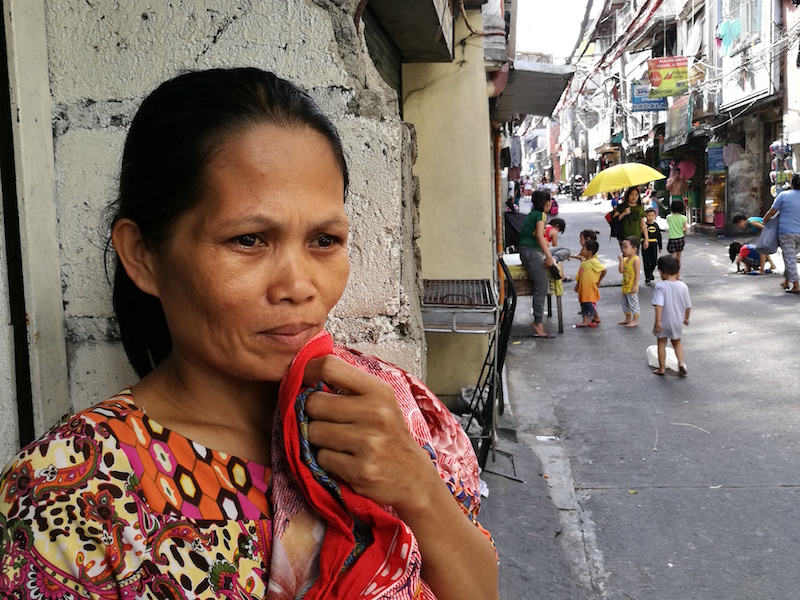 Zorayda Samporna regrets the decision to move to Metro Manila from the evacuation center in Saguiaran, Lanao del Sur, but going home to Marawi City is not an option for now. The Sampornas used to live in Banggolo district, which became part of the main battle area between government forces and the Maute Group, Abu Syayaf and its allies. Photo by REYNALD RAMIREZ
Zorayda Samporna regrets the decision to move to Metro Manila from the evacuation center in Saguiaran, Lanao del Sur, but going home to Marawi City is not an option for now. The Sampornas used to live in Banggolo district, which became part of the main battle area between government forces and the Maute Group, Abu Syayaf and its allies. Photo by REYNALD RAMIREZ
They put plywood and iron sheets to cover the place, but it is not enough especially during rainy days. “When it is raining, our floor gets wet,” she said.
They pay P4,500 rent per month for the four-square meter room the size of a jeepney.
Zorayda shared how her husband could not find a job. “No one wants to hire him. There is no vacancy even just as a store assistant,” she said.
Compounding the problem is that her husband is not fluent in Filipino and does not know how to read and write. “How will he find a job?” she asked.
For now, they depend on her older brother who owns a small food store in the compound for one meal a day. But they need to earn for the other meals.
Zorayda soon found that they left the two-meals-a-day life in the evacuation center in Saguiaran — breakfast and dinner — for yet another two-meals-a day in Metro Manila.
“In Marawi, we didn’t skip lunch” because they had money for three meals a day.
Before the siege, the family ran a fish stall in the Marawi Public Market.
Nowadays, they usually eat rice with soy sauce for dinner. It is the only food she can afford. During lunchtime, she gives them snack food such as crackers or corn chips. They need to wait until dinner to eat a full meal.
Ameerah Ibrahim, barangay councilor in Culiat Quezon City, said 13 families from Marawi are staying in Al Salaam Mosque Compound. “They have relatives here. We asked for the religious group Iglesia ni Cristo to give relief goods for the families who evacuated here,” said Ibrahim.
But Zorayda said the relief pack that includes instant noodles, rice, and canned goods lasted only for three days.
Missing school
Her children of school age were forced to quit school. “Everything happened so fast during our evacuation.”
But even with no classes to attend, the day starts early for Naim, 17, the third among the Samporna siblings. Along with his three brothers, he roams the busy street of Rizal Avenue in Manila selling cigarettes, to help put food on the table.
Naim misses his classmates at the Sen. Ninoy Aquino High School in Marawi where he was supposed to have been in Grade 8 this schoolyear.
Selling cigarettes in Manila is better than returning to Marawi City according to Naim. “I am happy because I am with my brothers every day. We are safe here.”
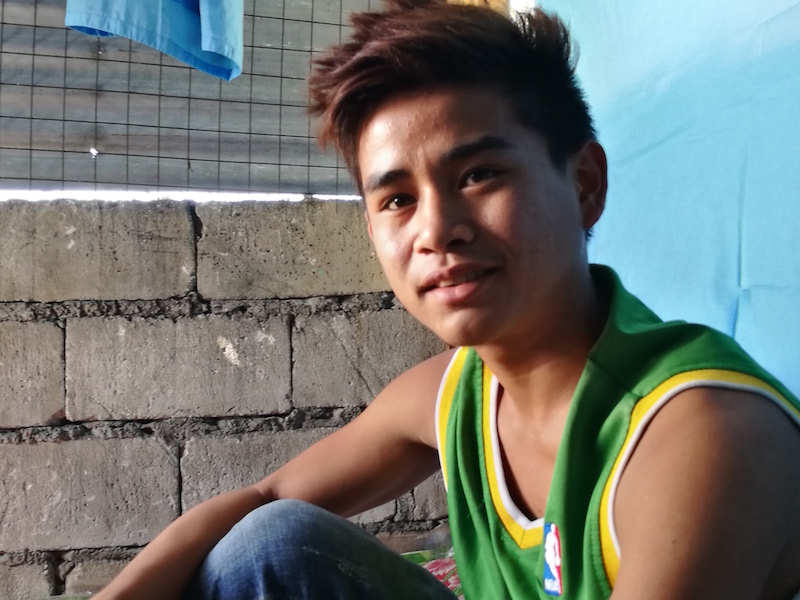 Naim would have been in Grade 8 at the Sen. Ninoy Aquino high school in Marawi City but in their Metro Manila home, school will have to wait. He sells cigarettes and reading eyeglasses to help bring food to the family table. Photo by REYNALD RAMIREZ
Naim would have been in Grade 8 at the Sen. Ninoy Aquino high school in Marawi City but in their Metro Manila home, school will have to wait. He sells cigarettes and reading eyeglasses to help bring food to the family table. Photo by REYNALD RAMIREZ
Their father helps them sellcigarette while he continues to look for a job. They also accepted odd jobs for additional income. “We also sell reading eyeglasses. We get 20 pesos per piece,” said Naim.
They are lucky if they earn a hundred or 200 pesos at the end of the day.
To save money, they spend the night in Rizal Avenue and sleep on the sidewalk so that they won’t need to spend for transportation home. On the average, they go home to Culiat twice a week.
For now, Naim has set aside his dream to become a soldier and is focusing on helping his parents.
“I can only go back to school next year if we have money,” he said.
Vulnerable Group
According to the 2015 Census of the Population, 154,840 Muslims live in Metro Manila or 1.2% of the Metro’s entire population.
Even before the Marawi crisis, employment of Moro people in the Metro has been an issue, said Professor Julkilpi M. Wadi of the University of the Philippines Institute of Islamic Studies.
“A recurrent issue of the Muslim community is Islamophobia. Because of the prevailing Islamophobia, there is an increased stereotype with hiring Muslims. It is not only reflected in companies but in other institutions as well,” said Wadi.
Metro Manila is not a greener pasture for the Marawi bakwits after all because it has an 8.5% unemployment rate, one of the regions with highest number of unemployed persons according to the Philippine Statistical Authority this year.
“The opportunities in Manila, contrary to the notion that there is work here, will not be as welcoming as compared to their places in Marawi,” said Professor Wadi.
Zorayda, in fact, regrets her decision to move to Manila. “But what can I do, we do not have money.”
Internally Displaced
Adiong said there are no laws to protect internally displaced persons (IDPs) in the Philippines.
“It is really hard for IDPs to be hired in the private sector because there is no law that demands them to employ IDPs. That’s the sad reality of war,” he said.
A bill aimed at protecting the rights of the IDPs was filed in the Senate last September 2016. Known as the Rights of the Internally Displaced Persons Act, SB 1142 seeks to provide protection of rights of IDPs during and after displacement as well as their return, local integration or resettlement elsewhere.
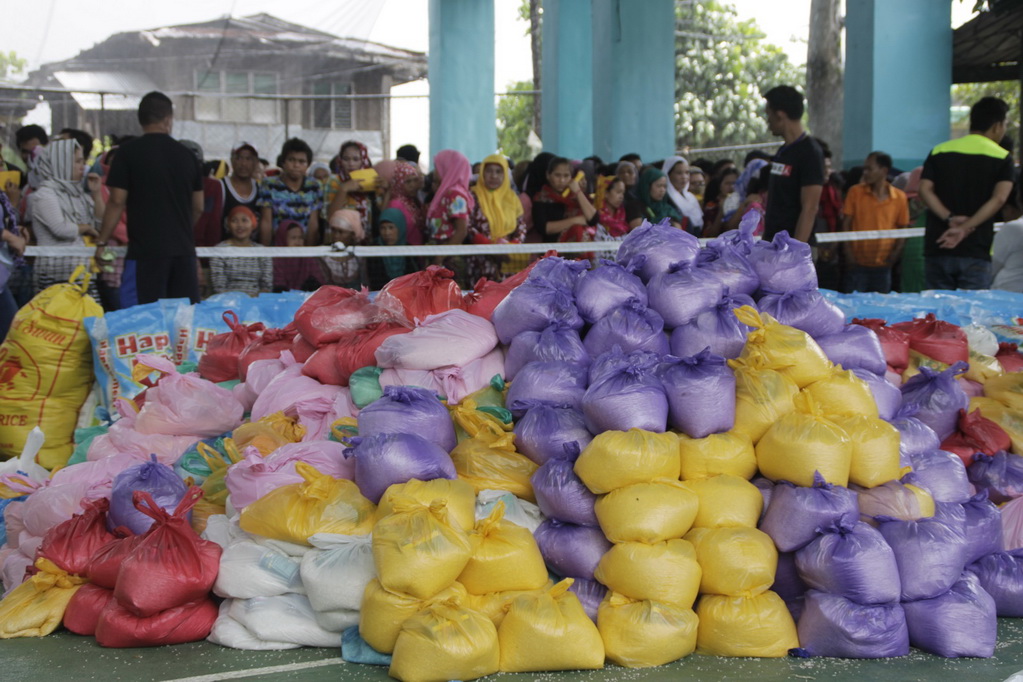 Evacuees from Marawi City line up while waiting for the distribution of goods at the covered court in Balo-i, Lanao del Norte on Tuesday, 30 May 2017. MindaNews photo by H. MARCOS C. MORDENO
Evacuees from Marawi City line up while waiting for the distribution of goods at the covered court in Balo-i, Lanao del Norte on Tuesday, 30 May 2017. MindaNews photo by H. MARCOS C. MORDENO
Under the measure, provision of access to basic necessities such as adequate food, water, shelter, clothing and medical services shall be afforded to IDPs during and after displacement.
The government, through the Department of Social Welfare and Development, is required to facilitate linking IDPs to employment opportunities support services and other livelihood programs. The bill also requires the government to provide capital assistance to IDPs who wish to start their respective business.
It has been over a year since the bill was filed in the Senate but, as of September 14, 2016, it is still pending at the committee level.
A similar bill that seeks to protect the rights of IDPs was filed in the Senate last July, two months after the start of Marawi Siege.
Under SB 1513, national authorities and local government are required to provide protection and humanitarian assistance to IDPs within their jurisdiction. The government is also required to facilitate linking IDPS to employment opportunities and livelihood programs.
As of July 26, 2017, the bill is still pending at the committee level.
Government Support
The Department of Social Welfare and Development continues to give relief assistance for residents displaced by the Marawi siege.
Through the Disaster Response Assistance and Management Bureau, families receive relief packs that include rice, canned goods and coffee. They will also distribute another set which has rice, mongo beans, dried fish, rock salt, turmeric powder, sugar and instant coffee. Each family pack is expected to last for two days. The DSWD will distribute these in bulk, enough for two weeks.
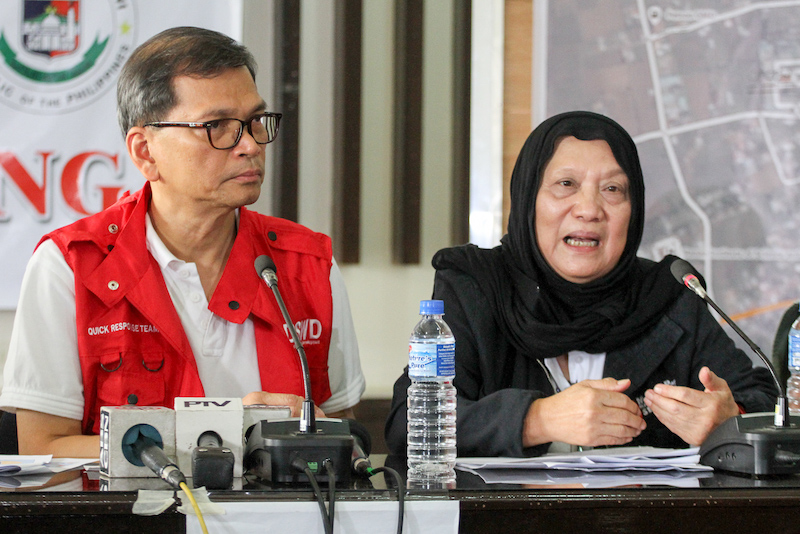 Acting Social Welfare Secretary Emmanuel Leyco listens as Director Bai Zorahayda Taha, Region 12 Director of the Department of Social Welfare and Development announces during a press briefing on Wednesday, 25 October 2017 the schedule of the return of evacuees in nine barangays. Taha is the designated focal person for Marawi . MindaNews photo by MANMAN DEJETO
Acting Social Welfare Secretary Emmanuel Leyco listens as Director Bai Zorahayda Taha, Region 12 Director of the Department of Social Welfare and Development announces during a press briefing on Wednesday, 25 October 2017 the schedule of the return of evacuees in nine barangays. Taha is the designated focal person for Marawi . MindaNews photo by MANMAN DEJETO
People in the evacuation centers and those who fled in other cities can receive the packages. Families like the Sampornas who are not staying in evacuation sites have to register at the nearest DSWD Field Office.
Zorayda has yet to register in the nearest DSWD Office to get her assistance. But she doesn’t know the location of the field office in NCR. “I don’t know that they give out assistance here. They never visit us here in Culiat,” she said.
The DSWD has handed out at least P682 million in cash and goods to residents displaced by the Marawi siege as of November 2017. The department also guaranteed that the additional P3.5 billion allocated budget for assistance would be distributed before end of 2017. Aside from aid, DSWD also implements cash-for-work program.
Rebuilding Marawi
The government estimates that the rebuilding effort in Marawi City will cost more than 20 billion pesos.
Adiong said one of the major problems is the rebuilding of the damaged residential area. The government will also focus on the socio-economic rehabilitation.
“We do not have a specific timeframe for the rehabilitation. It is also a matter of having a dedicated budget for that,” he said.
Zorayda and her family do not seem to care about the rebuilding efforts in Marawi City.
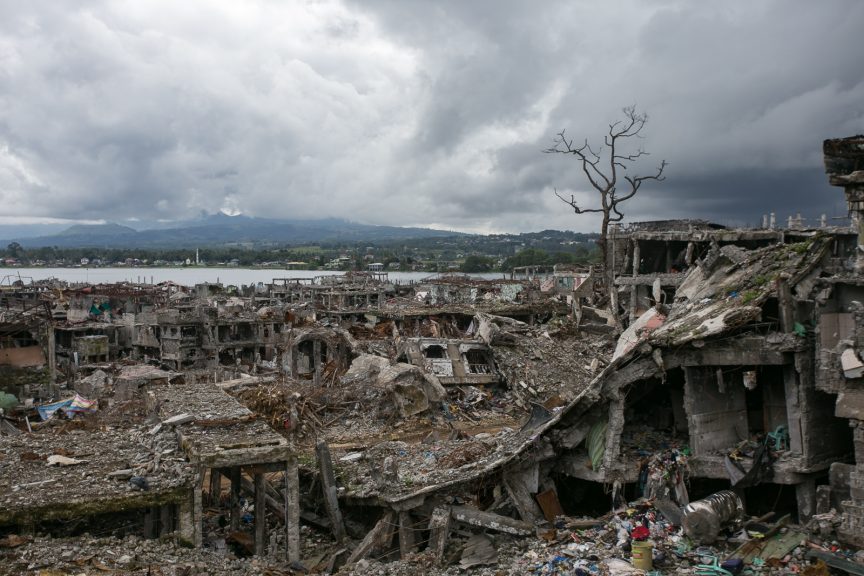 AFTERMATH OF TERROR. The view from Ground Zero along Quezon Avenue, beside the Bato Ali Mosque on 25 October 2017. MindaNews file photo by MANMAN DEJETO
AFTERMATH OF TERROR. The view from Ground Zero along Quezon Avenue, beside the Bato Ali Mosque on 25 October 2017. MindaNews file photo by MANMAN DEJETO
Going back to Marawi is not an option for now.
“I do not want to return home, there’s nothing left there,” said Naim.
What concerns them now is daily survival. “If ever I will have money, I won’t use it to go back home. I will just start a small business here in Manila,” Zorayda said. (Reynald Ramirez is a fellow of the Adenauer Fellowship for Media and Communication in Asia taking his Master of Arts in Journalism at the Ateneo de Manila University. He submitted a version of this story as part of the requirements for his Advanced Writing and Reporting course under Prof. Kim Kierans)
